- Home
- Joseph Bruchac
The Girl Who Married the Moon Page 3
The Girl Who Married the Moon Read online
Page 3
The next morning, the three brothers set out to hunt as usual, leaving their sister behind to care for the camp. But Little Listener did not do her daily chores. Instead, she cooked up a big pot of venison stew and placed it in the center of their lodge. She propped open the door of the lodge and spread bearskin robes to the left of the door to make a place of honor for a guest. Then she sat and listened and waited. Before long, she heard the sound of heavy feet walking around the camp. Although they came closer and closer, up the hill toward the wigwam, Little Listener did not move. Now the footsteps were so close that the lodge shook with each step. Still Little Listener did not move or speak. The footsteps stopped, and she could see the big shadow of someone standing just outside the door. That was when Little Listener spoke.
“Grandfather,” she said, “I am glad you have come to visit me. Come inside. I have cooked a special meal for you.”
As soon as she spoke, the huge head and shoulders of the Chenoo filled the door of the lodge.
“Granddaughter,” the monster said, his voice like the rumbling of great boulders rolling down a hill. “I accept your invitation.”
Then the Chenoo squeezed his way into the wigwam. Even though the lodge was large enough for Little Listener and her three brothers, the Chenoo barely fit inside. His big shoulders pressed against the sides of the wigwam, and his head reached up to the smoke hole in the roof.
“Grandfather,” Little Listener said, pushing the bowl of stew toward the Chenoo, “I know you are hungry. This food is for you to eat.”
The Chenoo reached out one hand and picked up the big clay stew pot as if it were a small drinking cup. He swallowed the stew with one gulp and then smiled, showing teeth as large as spear points.
“Granddaughter,” the Chenoo rumbled, “I am glad you greeted me and invited me inside. I was about to eat you. But as I have learned you are my relative, I will not hurt you or the others who live in this lodge. Tell me what I can do to help you.”
“Grandfather,” Little Listener said, “I am glad you have recognized me. There may indeed be some things that you can do to help. Now, though, all I want you to do is rest. I know you must be tired from walking so far to the north and the east, the south and the west. I have made a place for you with those bear robes. Go to sleep.”
Then Chenoo smiled again. “Granddaughter, I am tired indeed. I will do as you say, and I will rest.” Then the Chenoo lay down on the bear robes, covering the entire floor of the wigwam, and fell asleep.
Little Listener went outside. She closed the door of the lodge and sat in front of it with a smile on her face.
That evening, when her brothers returned, they were happy and full of stories.
“Today I have hunted well. Look at these rabbits I have brought back,” said the oldest brother.
“Today I, too, have hunted well. See the fine goose I have here,” said the second one.
“Today,” said the third brother, “I have brought home this fine deer that I killed with one arrow.”
Little Listener sat smiling in front of the closed door of the lodge, saying nothing. At last, when the three brothers had finished telling their stories, they asked her what she had done that day.
“My day was quiet,” she said. “I gathered berries and gathered firewood. I made a big stew and invited our grandfather into our lodge.”
“Our grandfather is here?” said the three brothers.
“Indeed,” said Little Listener. “He is sleeping now. I will wake him, but you must promise me to greet him as your relative when he comes outside.”
“Of course, we will greet him,” her brothers said. “Wake him up.”
Then Little Listener pulled open the door of the wigwam.
“Grandfather,” she said, “your other grandchildren are here. They wish to greet you.”
As soon as she spoke, the Chenoo poked his huge head and shoulders out of the lodge. The three brothers stared at him, so frightened they could not speak.
“Greet your grandfather,” Little Listener said.
The three older brothers spoke in shaking voices. “Grandfather,” they said, “we welcome you. We are glad to see you. It has been so long since we have seen you that you appear new to us.”
The Chenoo came out of the lodge and stood to look down at them. “Grandsons,” he said, “I am glad you have greeted me as a relative.” He looked at the game they had brought back. “I see you have gotten food for my dinner.”
Then the Chenoo reached out and swallowed the rabbits and the goose with one gulp and the deer with another. The three brothers simply sat and stared.
“Grandfather,” Little Listener said, “now that you have eaten, we have nothing for our own meal. Can you bring us some food?”
“Whatever you ask, I will do,” said the Chenoo. He took four big strides. The first carried him out of the camp. The second carried him down the hill. The third carried him across the valley, and the fourth carried him out of sight.
“Brothers,” Little Listener said, “try to remember to be more friendly to our grandfather when he returns.”
No sooner had she finished speaking than the Chenoo came striding back into camp, carrying two huge moose, one in each hand.
From that point on, life was easy for Little Listener and her brothers. The Chenoo made a lodge for himself from big trees and camped close to them. Each day, he helped them with their hunting. Not only were they able to feed themselves and the Chenoo on the game he brought, they also got many skins for trade and dried much meat to share with their relatives in the village.
When the time came for them to return, Little Listener went to say good-bye to her grandfather.
“We must return to our people,” she said to him.
“Granddaughter,” said the Chenoo, “I wish to come with you. But I do not wish to frighten the people. Although I may not appear fearsome to you and my grandsons, some people may be afraid of the way I look. Will you help me?”
“Yes, Grandfather. Tell me what we must do.”
“Make for me a sweat lodge and make it very hot.”
So Little Listener and her three brothers made a big sweat lodge. When it was ready, the Chenoo went inside by himself, and they closed the door of the lodge. After he had been there awhile, he called to Little Listener, “it is not hot enough.”
Little Listener opened the door, and her brothers piled on more hot stones. The red-hot stones were higher than the height of a tall man, but still the Chenoo called for heat. Three more times they opened the door and brought more stones. Then the Chenoo stayed inside a long, long time. At last, Little Listener called in to him.
“Grandfather,” she said, “are you all right?”
The voice that answered was small and weak. “Open the door, Granddaughter,” it said. “I am ready.”
When Little Listener opened the door, out crawled not the giant Chenoo, but an old man, no larger than any other old man. His hair was long and white, and his face was kind. He leaned over and coughed. Out of his mouth came a piece of ice shaped like a man.
“Granddaughter,” he said, “that is my heart. Throw it into the fire, and I will be able to remain a human being as you see me now.”
Her three brothers were afraid to touch it, but Little Listener grabbed the icy heart of the Chenoo and threw it into the fire. It melted away.
So it was that the kindness of Little Listener melted the heart of the giant Chenoo. So it was that she and her three brothers brought their grandfather back to the people. And when I last visited their village, all of them were still living there in happiness.
The Girl Who Escaped
Mohegan
There was once a girl named Flying Bird. She liked nothing better than to play in the forest with the dolls she made of wood and cornstalks. Her mother sometimes scolded her for not playing with the other children. But Flying Bird still preferred to go alone into the woods.
One day, as she was playing, Flying Bird noticed that she was not alon
e. A very small woman, no taller than her knee, was watching her from behind some berry bushes.
“Come and play with me,” Flying Bird said.
The little woman joined her, and the two of them played. From that time on, Flying Bird would come each day to visit with her new friend in the woods. She never said a word about it, for it was said that if you ever told anyone you had met one of the Makiawisag, the Little People, you would never see one of those Little People again.
Flying Bird grew to love her little friend. Whenever she ate a meal, Flying Bird would always take a bit of food and place it outside the lodge on a piece of bark so that Makiawisqua could share it with her.
“My friend,” Makiawisqua told her one day, “whenever you are in trouble, you can use your dolls to call on me to help you. Just talk to one of them, and I will hear it as clearly as if I were there.”
As Flying Bird grew older, she turned from a little girl into a strong young woman. However, she always carried at least one of her dolls under her belt as a way of keeping her friend Makiawisqua with her.
Now it was the time a young woman might choose a husband, but Flying Bird continued to prefer spending time by herself in the woods. Some of her friends teased her about this.
“Do you have a secret husband who is a bear?” they would say. And then everyone, including Flying Bird, would laugh. Because she was good-natured and friendly, Flying Bird was very popular. Her parents knew that she was a strong-minded young woman and would eventually find a young man to her liking. So they did not try to force her into marriage. Only a fine young man would be good enough for their daughter.
One day, a middle-aged man came to the village. Although he spoke their language and said he was a Mohegan, no one had ever seen him before. His name was Rough Hands. He explained that his village was far removed from the place where Flying Bird and her people lived, a journey of many days to the west of the Long River. Still the people welcomed him. They gave him food and a place to stay in one of their lodges.
That night, as everyone sat around the fire, he stared at Flying Bird. “I would like to take this young woman for a wife,” Rough Hands said.
His words did not make Flying Bird happy. This strange man did not act in a friendly way. And there was something in his eyes she did not like.
“I am not yet ready to take a husband,” Flying Bird said.
“You will not find a better husband than I,” said Rough Hands. “I am a great hunter and have more power than anyone in this village.”
The people of Flying Bird’s village did not like such words. But Flying Bird’s mother answered Rough Hands politely, saying, “Our daughter is not yet ready to leave her home.”
A dark cloud seemed to pass over the strange man’s face, but he said nothing more. That night, Rough Hands waited until all the people in the village had gone to their lodges. He began to sing a magical song. The song had so much power that everyone fell fast asleep. Then he crept into the lodge where Flying Bird and her family were sleeping. He took out a cord and tied it tightly around Flying Bird’s hands and feet, picked her up, and carried her off.
When Flying Bird awoke, she was in a canoe going down the river. She tried to move, but her hands and feet were tied.
“You were not ready to leave your home,” said a harsh, mocking voice. “Are you ready now?”
Flying Bird turned her head and saw Rough Hands sitting in the back of the canoe with his paddle in his hand and an ugly smile on his face. She said nothing in response to his words.
All that day, as they went down the river, Flying Bird did not speak. At last, when it was growing dark, Rough Hands pulled his canoe up to the shore. He lifted out his captive.
“We will spend the night here,” he said. “I have a fine shelter that I made on my way to your village.”
Carrying Flying Bird over his shoulder, Rough Hands walked up the bank and to the edge of the forest. There stood a poorly made lean-to constructed of dry sticks and rotting bark. Rough Hands dumped his prisoner on the ground and threw an old deerskin blanket over her. He made a big fire before standing up and throwing a pack over his shoulder.
“I am going to check the snares I left here,” he said. “When I come back, you can cook my food for me.”
As Rough Hands disappeared into the forest, Flying Bird tried to free herself, but the knots were too tight. Suddenly, she remembered that she had with her one of her dolls, tied to her belt by a string.
“My friend,” she said, looking at the doll, “I am in trouble. Come and help me.”
Something struck the side of the lodge. Something struck it again. Then Flying Bird saw a third pebble hit the side of the lean-to. When she looked up, she saw the one who threw it—her friend Makiawisqua.
The little woman walked over to her. She touched the cords that held Flying Bird’s hands and feet, and they came untied.
Flying Bird stood up, but she felt too weak to run. How could she escape before Rough Hands came back?
“Ask your friend to help us,” Makiawisqua said. “Blow on the wooden doll.”
Flying Bird took the wooden doll from her belt. As she blew on it, the doll grew larger and larger. Soon it was the same size as Flying Bird and looked just like her. The little woman breathed on the doll, and it began to breathe. She placed it under the old deerskin blanket, took Flying Bird by the hand, and led her far away from the camp.
When Rough Hands returned to his lean-to, he was not happy. His snares, which had been poorly made, were all empty. And the fire had burned down to a few coals.
“My wife,” he said, “do not be afraid. I have come back for you.” He built up the fire and was pleased to see by its light that Flying Bird was there as he had left her. But when he crawled under the blanket and put his arms around the wooden doll he thought was his captive, his arms and hands filled with splinters.
Far down the trail that led through the hills, Flying Bird and Makiawisqua heard a terrible howling sound. “That bad man has discovered you are gone. We must not stop,” Makiawisqua said.
The moon had risen and its light was very bright. They looked back from a hilltop and saw Rough Hands running very fast across the valley below, following their trail.
Makiawisqua took a stone from the pouch on her belt and said to Flying Bird, “Throw this toward that bad man.”
Flying Bird took the stone and threw it toward Rough Hands, who had almost reached them. As soon as the stone struck the earth in front of the bad man’s feet, it grew and grew until it was a tall range of mountains. Today all that remains of those mountains is Wintechog Hill in southwestern Connecticut.
Flying Bird and Makiawisqua began to run once more. The sun rose in the sky and still they ran. But while they raced across a wide meadow, Makiawisqua looked back. Rough Hands was close behind them.
“That bad man is getting close again,” she said. The little woman reached up and took a comb made of carved bone from her hair. She handed it to Flying Bird. “Throw this down on the ground between us.”
Flying Bird took the comb and hurled it to the ground. As soon as it struck, the comb turned into a field of briers and brambles that tangled around Rough Hands and held him tight. Some of those briers still grow to this day in the hills around Uncasville, near the Thames River in Connecticut.
Flying Bird and Makiawisqua began to run as before. They ran all that day, heading to the northwest toward the Long River. At last, they were close to the place where Rough Hands had crossed the river. Flying Bird’s village was on the other side.
“I can go no farther with you,” Makiawisqua said. “Now you must take care of yourself.” She took a tiny birch-bark canoe and a paddle made from a spruce twig out of her pouch. As she blew on them, they grew larger. “Go quickly,” she said. “That bad man is near us again.”
Flying Bird pushed her canoe out onto the wide river and began to paddle. When she was halfway across, she looked back. There was Rough Hands, close behind her in another canoe. Inste
ad of paddling it, he was singing a magic song and the canoe was speeding across the water toward her. Just as it seemed he was about to catch up with her, on the other shore, Makiawisqua began to sing a song of her own. As she sang, the currents in the river divided and began to push the boat of the bad man back toward the other shore. Flying Bird paddled as hard as she could. The current helped her, carrying her farther and farther away from Rough Hands. His song turned into howling, then stopped. When she looked around, his boat had vanished. He was never seen again.
So Flying Bird escaped from the man who tried to force her to be his wife. She returned to her village, where her parents and friends greeted her with joy.
Less than a moon later, a fine young man named Good Eyes, from another Mohegan village to the south, came with his parents to visit. As soon as Flying Bird saw him, she knew he was the man she wanted for a husband. As soon as he looked at her, Good Eyes knew that he wanted her for his wife. So things went very well when Flying Bird asked her mother to go to the mother of Good Eyes and speak of marriage. Within a few moons, the two young people were wed.
Flying Bird and her husband lived together happily and had strong children. It was said that of all the girls in the village, their daughters always had the best dolls. And they were never scolded by their mother for playing by themselves in the forest.
The Southeast
The southeastern part of what is now the United States covers a vast area with diverse topography, from coastal lands to mountains to rich river valleys. Before European contact, this region was home to some of the most advanced societies found in Native North America. The people were skilled artisans, hunters, and fishermen with complex social systems. Extensive trade routes existed between nations, and most tribes possessed special skills, such as basket making or shell carving, producing goods that were prized by other peoples. Though many nations were often at war with their neighbors, Native warfare differed greatly from its European counterpart, consisting as it did of small-scale raids that resulted in few casualties.

 Peacemaker
Peacemaker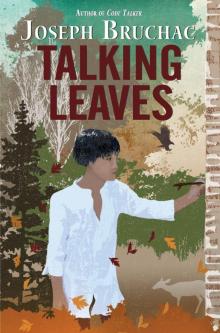 Talking Leaves
Talking Leaves Found
Found Killer of Enemies
Killer of Enemies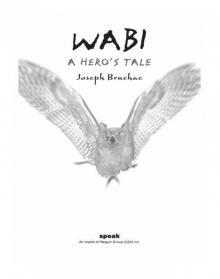 Wabi
Wabi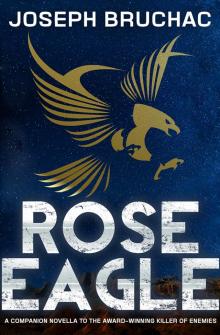 Rose Eagle
Rose Eagle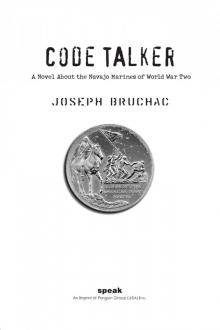 Code Talker
Code Talker The Long Run
The Long Run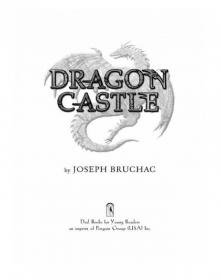 Dragon Castle
Dragon Castle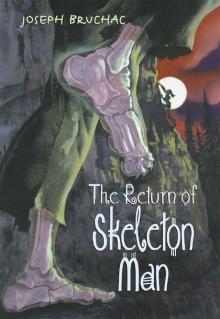 The Return of Skeleton Man
The Return of Skeleton Man Pocahontas
Pocahontas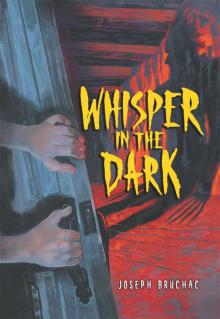 Whisper in the Dark
Whisper in the Dark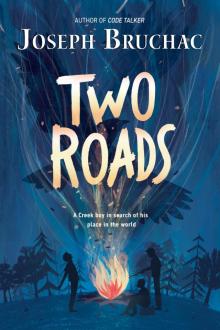 Two Roads
Two Roads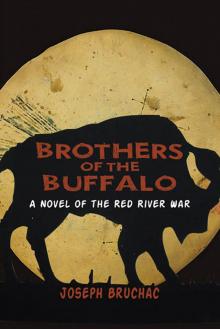 Brothers of the Buffalo
Brothers of the Buffalo The Warriors
The Warriors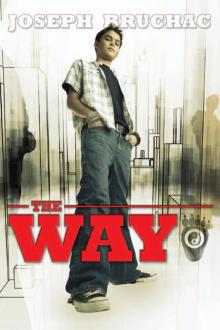 The Way
The Way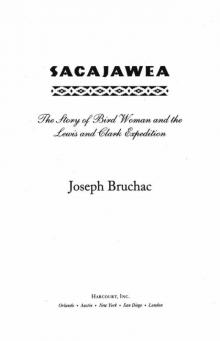 Sacajawea
Sacajawea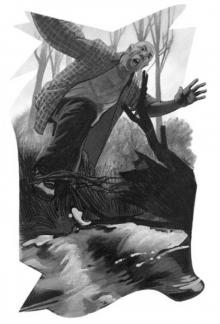 Night Wings
Night Wings March Toward the Thunder
March Toward the Thunder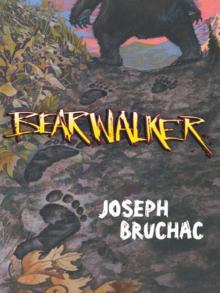 Bearwalker
Bearwalker Skeleton Man
Skeleton Man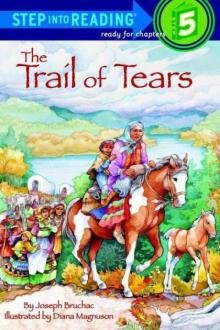 The Trail of Tears
The Trail of Tears On This Long Journey
On This Long Journey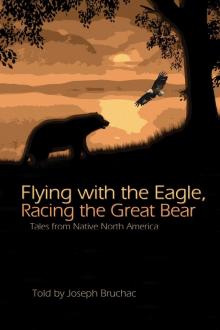 Flying with the Eagle, Racing the Great Bear
Flying with the Eagle, Racing the Great Bear